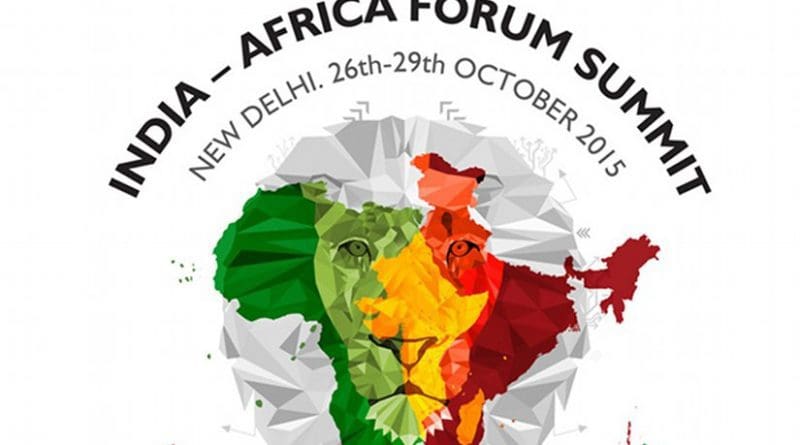Articulating The African Voice – Analysis
The India-Africa Forum Summit in New Delhi this week has not generated much excitement among African media, academia, and think tanks. But it will be useful for the African bloc to have a strategic game-plan about the Africa-India relationship of the future, across such areas as trade and public health.
By Sanusha Naidu*
The 3rd India-African Forum Summit in New Delhi from 26 to 29 October is generating some hype among the Indian and international media, but the same excitement is missing from the African landscape. Even in the African think tank community, the response to the summit seems to be muted, except for a few organisations in South Africa and Kenya which have produced analytical commentaries in the run-up to the event.
Considering that this is one of the largest gatherings of African leaders and governments in India’s capital, why is the excitement not escalating among mainstream African media, academia, and think tanks? This is even more a question because South Africa will co-host the 6th Forum on China-Africa Cooperation in early December—and summits with two of Africa’s main trading and development partners in the same year make it even more important for the African voice to be heard. Sadly, this voice is rather faint at the moment.
Have African governments or even civil society sought, in any way, to define their expectations of the summit in New Delhi? A preliminary mapping of African media on the internet shows few commentaries about the summit. Neither does it look like many African analysts are being asked to provide insights to the Indian and international media about their perspective on the summit. The bulk of the analysis is informed by an Indian viewpoint.
With such a dearth of views from the African side, it is difficult to determine what Africa expects from the summit, or if the 51-plus African leaders and governments that will be attending have a broad strategic game-plan. It is also not clear to what extent the African participants will be speaking in one voice at the summit. Instead, the African side appears to be attending merely as guests who have not defined what they want to achieve in their engagement with India.
So what should the African bloc think of in terms of pragmatic summit outcomes?
The first expectation must be about less rhetoric and more coherence in the relationship between the two sides. While historical linkages are important, only these cannot define how India conceptualises its relationship with African countries. It would be useful for the African participants to have some policy coherence that includes concrete steps about how they will shape their relationship with India in the 21st century. Such a document can provide a roadmap for how Africa fits into India’s foreign policy agenda. It is also important for both sides to discuss guidelines for responsible and socially beneficial investment by Indian corporates in African economies.
The second expectation should be about how Africa’s engagement with India serves the continent’s interests in moving up the global value chain at a time when India’s role in global trade is growing. While India seeks to open duty and quota free market access for Less Developed Countries in Africa, this does not always allow Africa to develop its productive capacities and industrialisation prospects. Africa must become competitive if it wants to integrate into the low-cost labour-intensive global value chain.
The nature of its trading relationship with India therefore needs to change. African countries must use the opportunities presented through their trade and investment relationship with India to boost their own capacities and competitiveness, because New Delhi is not going to give up its comparative advantage in the global chain value chain.
The third expectation centres on Africa’s public health. Both sides must recognise that health diplomacy is more than just access to affordable drugs to combat HIV/AIDS or communicable diseases. The summit could open up a dialogue around collaborative research and development of public health capacities. This can become a significant platform for improving India-Africa health diplomacy.
Finally, Africa must insist that any engagement between India and other actors that involves the continent must be done in consultation with the African Union. For example, an agreement between Washington and New Delhi to train troops in six African countries before they are deployed on UN peacekeeping missions was announced in September. Such plans must reflect Africa’s interests first and foremost, and the continent’s role in these deliberations must not be confined to that of a junior partner.
The summit is also an opportunity for India to finally put to rest some of the critiques of its Africa policy, especially that Africa is not a priority in India’s foreign policy. The Modi government can counter this by publishing its first white paper on its Africa engagement. This will be a departure from the previous two summits and will give the third summit a strategic orientation. Additionally, a think tank forum and a civil society dialogue to complement the business linkages can further strengthen ties between the two sides.
Now we have to see what the summit delivers.
About the author:
*Sanusha Naidu is a senior research associate at the Institute for Global Dialogue in Pretoria, a research associate with the Department of Political Science at the University of Pretoria, and a project manager for the Africa-Emerging Powers Programme at Fahamu—the Pan-African Network for Social Justice Issues based in Nairobi.
Source:
This article was written for Gateway House: Indian Council on Global Relations.

